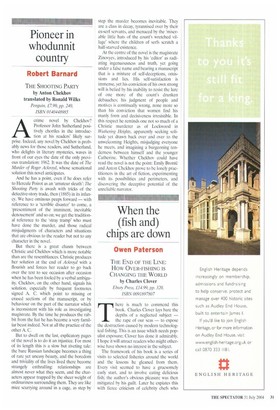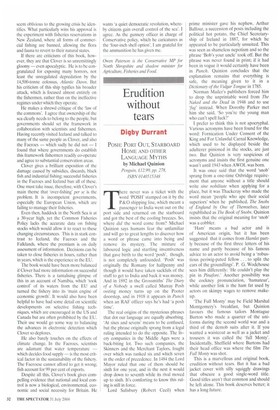When the (fish and) chips are down
Owen Paterson
THE END OF THE LINE: How OVER-FISHING IS CHANGING THE WORLD by Charles Clover Ebury Press, £14.99, pp. 320, ISBN 0091897807 There is much to commend this book. Charles Clover lays bare the depths of a neglected subject — the rape of our seas — to expose the destruction caused by modern technological fishing. This is an issue which needs populist exposure; Clover has done it admirably. I hope it will attract readers who might otherwise have shown no interest in the subject.
The framework of his book is a series of visits to selected fisheries around the world and the lessons he gleaned from them. Every visit seemed to have a gruesomely early start, and to involve eating delicious fish; the author's obvious pleasure was then mitigated by his guilt. Later he expiates this with fierce criticism of celebrity chefs who
seem oblivious to the growing crisis he identifies. What particularly wins his approval is the experiment with fisheries reservations in New Zealand, where all forms of commercial fishing are banned, allowing the flora and fauna to revert to their natural states.
If there are criticisms of this book, however, they are that Clover is so unremittingly gloomy — even apocalyptic. He is to be congratulated for exposing many horrors, not least the unregulated depredation by the 14,500-tonne colossus, Atlantic Dawn. But his criticism of this ship typifies his broader attack, which is focused almost entirely on the fishermen, rather than on the ineffective regimes under which they operate. He makes a shrewd critique of the `law of the commons'. I agree that ownership of the sea clearly needs to belong to the people, but governments should set the framework in collaboration with scientists and fishermen. Having recently visited Iceland and talked to many of the same people as Clover, and also the Faeroes — which sadly he did not — I found that where governments do establish this framework fishermen readily co-operate and agree to substantial conservation areas. Clover gives a brilliant exposition of the damage caused by subsidies, discards, black fish and industrial fishing; successful fisheries in the Faeroes and Iceland ban all of these. One must take issue, therefore, with Clover's main theme that 'over-fishing' per se is the problem. It is incompetent governments, especially the European Union, which are failing to manage their fisheries. Even then, haddock in the North Sea is at a 30-year high, yet the Common Fisheries Policy lacks the accurate data on fishing stocks which would allow it to react to these changing circumstances. This is in stark contrast to Iceland, the Faeroes and the Falklands, where the premium is on daily assessment of information. Decisions can be taken to close fisheries in hours, rather than in years, which is the experience in the EU. The book would have been more balanced if Clover had more information on successful fisheries. There is a tantalising glimpse of this in an account of Namibia, which 'took control' of its waters from the EU and turned the fishery into its `main engine of economic growth'. It would also have been helpful to have had some detail on scientific developments on selective fishing techniques, which are encouraged in the US and Canada but are often prohibited by the EU. Their use would go some way to balancing the advances in electronic detection which Clover so deplores. He also barely touches on the effects of climate change. In the Faeroes, scientists are adamant that water temperature — which decides food supply — is the most critical factor in the sustainability of the fishery. The Faeroese cannot afford to get it wrong; fish account for 99 per cent of exports. Despite all this, Clover's book gives compelling evidence that national and local control is now a biological, environmental, economic and social necessity for Britain. He wants 'a quiet democratic revolution, whereby citizens gain overall control of the sea'. I agree. As the gunnery officer in charge of Conservative policy, which he caricatures as the `four-inch shell option', I am grateful for the ammunition he has given me.
Owen Paterson is the Conservative MP for North Shropshire and shadow minister for Agriculture, Fisheries and Food.



























































 Previous page
Previous page